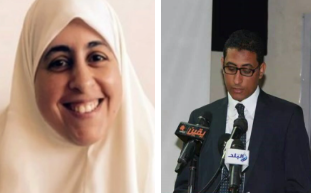Bloomberg: State Scrutiny and Midnight Disturbances Make Egypt’s COP27 the Most Chilling of Climate Talks
Bloomberg published a report on Saturday reviewing incidents that it said soured the peace of the COP27 climate conference, describing the summit as “ a sinister experience for environmental activists and country negotiators alike.” “The incidents — recounted to Bloomberg by several conference attendees — offer a glimpse of life in a country where protests are effectively banned and criticism of the government severely curtailed. Though Egypt has released a few hundred political prisoners this year, thousands more languish in jails, often without a fair trial.
“Climate campaigners, usually a significant presence at the UN’s flagship two-week event, had already reported unprecedented hurdles obtaining accreditation and securing accommodation for this year’s conference. The relatively small number who made it have seen their difficulties worsen since arriving in the Red Sea resort town of Sharm el-Sheikh nearly a week ago, according to multiple accounts from delegates, most of whom asked to remain unnamed to avoid problems with Egyptian authorities. “On her second night in Sharm el-Sheikh, Jo Dodds, president of Australian non-profit Bushfire Survivors for Climate Action, braced with a can of insect repellent and a knife when unidentified people spent several minutes wrestling with the lock of her apartment door late at night. She yelled in anger, and the people eventually left, but she said the incident shook her.
“I didn’t sleep that night,” said Dodds, who intends to raise the issue with Australia’s Department of Foreign Affairs. “I was terrified.” “Inside the conference zones, delegates said unusual incidents had raised suspicions of Egyptian government surveillance. “At one high-level meeting held in the so-called Red Zone, where access is restricted, and people are escorted in and out, conversations had been underway for several minutes before participants realized that an unidentified Egyptian was sitting in the room. According to a person who witnessed the incident, they rushed out when asked to explain their presence.
“Heads of up to 60 country delegations could not reach Egyptian officials for the first two days of the summit when world leaders were in town, according to one government official attending the talks. When they were eventually able to get through, told they said they had already resolved the issues and had already decided on the problems, the official said. “Wael Aboulmagd, the special representative for the Egyptian COP27 presidency, said the host had “addressed some of the specifics that were taken up and brought to our attention” and urged others to continue reporting cases so they could be dealt with. He did not explain the incidents. “The uncomfortable experiences have cast a pall over a lively affair.”
On Monday, Reuters reported that German police had warned their country’s delegation to the COP27 climate conference that they might be vulnerable to spying by Egyptian security. The German police had told delegates that Egyptian agents might record their conversations and that people close to the Egyptian government might try to disrupt events “through provocative actions.”
Two German participants have noticed suspicious movements, including being stalked and photographed, at events. They also said they were subjected to verbal warnings from other participants about possible surveillance. The Associated Press has said the United Nations is investigating allegations of misconduct by Egyptian police officers involved in securing the conference. On Tuesday, UN security personnel expelled an Egyptian parliamentarian from a press conference for Sanaa Seif, sister of imprisoned Egyptian-British activist Alaa Abdel Fattah, after he verbally assaulted her.
At the conference held on the sidelines of the COP27 climate summit, Seif spoke about her brother, who has been on hunger strike for seven months, stressing that his life is in danger and that his family has not known about him for weeks. Amr Darwish, a deputy in the Egyptian parliament, criticized Seif, saying, “You are trying to seek help from the West to pressure the Egyptian government. This is unacceptable interference in Egyptian affairs.” Darwish accused Abdel Fattah of insulting the Egyptian government, army and state, adding that he must be punished for that. When Seif tried to respond to him, Darwish continued his verbal attack on her and the rest of the speakers next to her on the stage before the UN security men asked him to leave the room.





Recent Comments